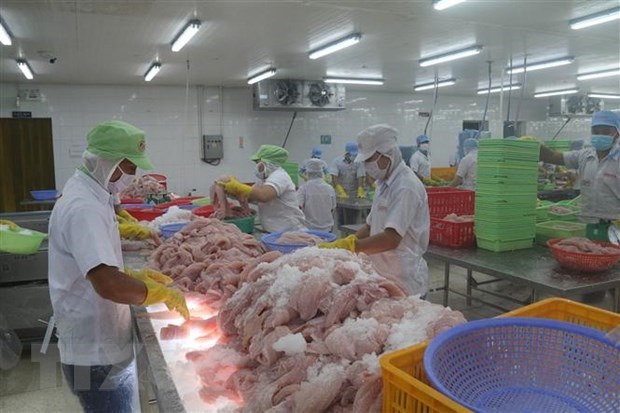Agricultures, Foods, News & Event
Opportunities for Vietnamese goods to go to the world from the Japanese market
According to the Vietnamese Counselor in Japan, if entering the Japanese market, this is the “passport card” for Vietnamese goods to go to other markets around the world.

“Japan has very strict import regulations and standards. If meeting Japanese standards, Vietnamese goods can not only penetrate this difficult market but also enter most other markets in the world.
In other words, if entering the Japanese market, this is the “passport card” for Vietnamese goods to go to other markets around the world.
In other words, if entering the Japanese market, this is the “passport card” for Vietnamese goods to go to other markets around the world.
This is the comment of Mr. Ta Duc Minh, Counselor of Vietnam in Japan, in an interview with a VNA reporter about economic diplomacy in the area.
According to Mr. Ta Duc Minh, over the years, the Vietnam Trade Office in Japan has made efforts to connect the import-export needs of enterprises of both countries through many forms; searching and selecting reputable and quality enterprises that meet the requirements set forth to introduce to Japanese partners.
During the COVID-19 pandemic, the deal has coordinated with the authorities of the two countries to organize many online trade promotion activities, support domestic enterprises to register booths at many international fairs and exhibitions. International Food and Beverage Exhibition (Foodex Japan), which has successfully connected many Vietnamese businesses with importers in Japan.
Through the connection of the deal, a number of Vietnamese agricultural and food products such as coconut water, Vietcoco branded coconut milk or Vietnamese coffee and peanuts have successfully penetrated into the distribution chain in Japan. Copy; Vietnam’s agricultural, aquatic products and food products are increasingly appearing on the shelves of major supermarket chains in Japan such as AEON, Donkihote or Itoyokado with quite diverse categories.
The deal also has promotional activities to introduce Vietnamese agricultural products and fruits at large supermarkets such as Vietnam Week at AEON supermarket chain or during the Vietnam Festival in Tokyo.
Especially, at the Vietnam Festival in June 2022, the deal was first coordinated with the People’s Committee of Bac Giang province, Global Import-Export Joint Stock Company and Ameii Vietnam Joint Stock Company. introduced fresh lychee fruit to Japanese consumers.
With the goal of encouraging Vietnamese people in Japan to use Vietnamese goods as well as meeting the increasing needs of the Vietnamese community in this market, the deal signed a memorandum of cooperation with the Vietnam Business Association in Vietnam. Japan, and at the same time coordinate to help connect and bring Vietnamese goods into the system of commercial centers of members of the Association specializing in food and consumer goods.
Assessing the advantages in bringing Vietnamese goods to the Japanese market, Mr. Ta Duc Minh said that Vietnam and Japan have a structure of import-export goods that do not compete directly but are complementary to each other.
Vietnam has a high demand to import products with high technology content and added value from Japan, while Japan has a great demand for agro-forestry-fishery products, processed foods, and textiles. garment and footwear of Vietnam.
With a population of more than 125 million people, Japan is a market with great demand for imported agricultural and aquatic products and food, such as fish and fish products, shrimp, eel, meat and other products. from meat, soybeans, cereal products, fresh and processed vegetables, coffee… These are all Vietnamese products that are considered to have strengths and are able to supply well to the Japanese market.
Besides, the fact that the two countries are members of many free trade agreements (FTAs) such as the Vietnam-Japan Economic Partnership Agreement (VJEPA), the ASEAN-Japan Comprehensive Economic Partnership Agreement, etc. (AJCEP), the Comprehensive and Progressive Agreement for Trans-Pacific Partnership (CPTPP) or the Regional Comprehensive Economic Partnership (RCEP), with many preferential commitments to cut tariffs at a deep level, has been create many opportunities to expand trade cooperation.
Within the framework of the CPTPP and RCEP, Japan is an expected export market of Vietnam due to the advantages of distance, which makes logistics costs low and goods transportation easier than the EU or US markets.
When the CPTPP and RCEP took effect, the export of goods to Japan has become more favorable by taking advantage of the rules of origin of these FTAs. RCEP integrates ASEAN+ FTAs, so when put into effect, it allows businesses to uniformly apply a set of rules of origin and a form of certificate of origin. This is a huge step forward in simplifying export procedures.
The current development trend of Vietnam’s agricultural industry is to promote agricultural product processing and add value to agricultural products instead of exporting raw materials. This trend is especially suitable for FTAs that are increasingly expanding the market size because the origin of goods is not only based on where they are grown/raised, but also where they are processed/manufactured.
Therefore, Vietnamese businesses that want to take advantage of the advantages brought by CPTPP and RCEP need to pay attention to the rules of origin of goods in order to choose beneficial partners, such as where to import raw materials from will have an advantage. origin is cumulative, thereby increasing the ability to take advantage of preferential origin to enjoy preferential tariffs.
Mr. Ta Duc Minh said that the Japanese market is a notoriously difficult market with many strict import standards. Therefore, to ensure that Vietnamese goods and products can successfully penetrate and have a foothold in the Japanese market, it is important to first focus on building a national brand for the product.
Exporting enterprises of Vietnam and enterprises importing and selling goods in Japan and related management agencies need to cooperate in building the brand name of Vietnamese goods that are quality goods. high, competitive, in line with the tastes and consumption needs of the Japanese people.
In the coming time, the deal will continue to promote coordination with the Vietnam Business Association in Japan and Vietnamese-invested enterprises in this country to respond to the campaign “Vietnamese people prioritize using Vietnamese goods” and “Mobilizing overseas Vietnamese to participate in introducing and consuming products and developing distribution channels of Vietnamese goods abroad, period 2020-2024.”
In particular, the deal will focus on goods that Vietnam has strengths and Japan has high demand for, such as textiles, agricultural, forestry and fishery products, food, handicrafts, etc.
The deal will also strengthen and further expand the market for some products that have a certain foothold in Japan such as bananas, dragon fruit, coffee, cocoa, cashews, spices, processed foods, etc. ., and at the same time promote trade promotion activities for potential products of Vietnam such as textiles, apparel, footwear or mechanical engineering, through participation in fairs, exhibitions, and communication connections. trade to find suitable partners, good opportunities to maintain and expand market share in the Japanese market.
Source: https://www.vietnamplus.vn/co-hoi-cho-hang-hoa-viet-ra-the-gioi-tu-thi-truong-nhat-ban/832654.vnp
